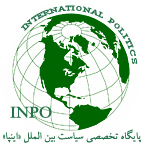زبان تخصصي : ( مفاهیم تخصصی 6) 6 International relations Concepts
زبان تخصصي : ( مفاهیم تخصصی 6) 6 International relations Concepts
High Politics سیاست اولی
Within international relations, and political science as a whole, the concept high politics covers all matters that are vital to the very survival of the State: namely national and international security concerns. It is often used in opposition to "low politics". Although the idea of high politics has been present in all cultures and epochs, Hobbes was the first to enunciate that survival (of trade, the laws, societal order, etc.) hinges upon a finite number of ingredients. For him, these ingredients were embodied and provided by the State. However, interpreting Hobbes , these ingredients are what we call "high politics."
The term "high politics" in itself was probably coined during the Cold War, given the stakes of an atomic war. The advent of the atomic bomb made it clear what was ultimately worth fighting for and what was not. Hence, made clear what "high politics" meant. In that sense, the United States and the former USSR would have gone to war for a direct atomic threat, but would have never gone to war over "low politics", say, a boycott of the Olympic games. Trade, for all its importance, is considered by most political scientists as "low politics", as it depends on specific security conditions to come into effect
Power Politics سیاست قدرت
Power politics, or Machtpolitik (borrowed from German), is a state of international relations in which sovereigns protect their own interests by threatening one another with military, economic, or political aggression. Power politics is essentially a way of understanding the world of international relations: nations compete for the world's resources and it is to a nation's advantage to be manifestly able to harm others. It prioritizes national self-interest over the interest of other nations or the international community.
Techniques of power politics include, but are not limited to, conspicuous nuclear development, pre-emptive strike, blackmail, the massing of military units on a border, the imposition of tariffs or economic sanctions, bait and bleed and bloodletting, hard and soft balancing, buck passing, covert operations, and asymmetric warfare.
 پايگاه تخصصي مطالعاتي INPO مكاني صرفاً علمي و آكادميك جهت استفاده اساتيد، دانشجويان و علاقمندان حوزه سياست بين الملل (روابط بين الملل، مطالعات منطقهاي، علوم سياسي، حقوق بین الملل و سایر گرایشهای مرتبط)، که با هدف توسعه و ترویج روزافزون گرایشات آکادمیک در حوزه سیاست بین الملل راه اندازی شده است. این پایگاه بدون شک در آینده ای نزدیک با کیفیتی بالاتر و با استفاده از نظرات اندیشمندان این حوزه حضوری چشم گیرتر در صحنه آکادمیک کشور ایفا خواهد نمود. اين پايگاه در نظام ساماندهي وب سايت های وزارت فرهنگ و ارشاد جمهوري اسلامي ايران به ثبت رسيده و در چارچوب قوانين ج.ا.ايران فعاليت خواهدداشت.
پايگاه تخصصي مطالعاتي INPO مكاني صرفاً علمي و آكادميك جهت استفاده اساتيد، دانشجويان و علاقمندان حوزه سياست بين الملل (روابط بين الملل، مطالعات منطقهاي، علوم سياسي، حقوق بین الملل و سایر گرایشهای مرتبط)، که با هدف توسعه و ترویج روزافزون گرایشات آکادمیک در حوزه سیاست بین الملل راه اندازی شده است. این پایگاه بدون شک در آینده ای نزدیک با کیفیتی بالاتر و با استفاده از نظرات اندیشمندان این حوزه حضوری چشم گیرتر در صحنه آکادمیک کشور ایفا خواهد نمود. اين پايگاه در نظام ساماندهي وب سايت های وزارت فرهنگ و ارشاد جمهوري اسلامي ايران به ثبت رسيده و در چارچوب قوانين ج.ا.ايران فعاليت خواهدداشت.